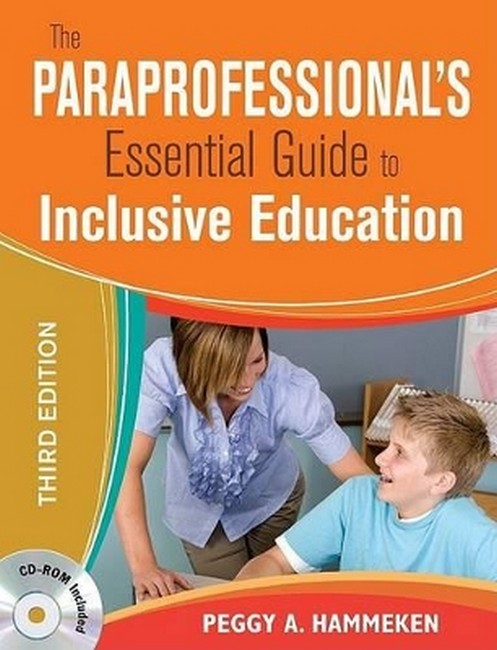Peggy Hammeken began her career as an elementary teacher in the American Embassy School in Mexico City. Upon return to the United States, she taught students in the areas of specific learning disabilities, mental retardation, and emotional/behavior disorders. With the implementation of inclusive education, she was involved with the set-up of inclusive programs and staff development and training for educators and paraprofessionals. She has authored three books on the subject. Hammeken received her elementary teaching degree and her master's degree in special education from Minnesota State University, Mankato. Hammeken founded Peytral Publications, Inc., a publishing house focusing on inclusive education of students.
Request Academic Copy
Please copy the ISBN for submitting review copy form
Description
Preface Acknowledgments About the Author Introduction 1. Building Background Activities Inclusive Practices: Myth and Reality Benefits of Inclusive Education 2. The Special Education System Student Placement What Are Handicapping Conditions? Classroom Implications Conclusion 3. The Special Education Team 4. Confidentiality and Special Education Mandated Reporting Confidentiality Related to Students Activities Guidelines for Confidentiality 5. Getting Started Learning About Policies and Procedures The Paraprofessional's Role Role Delineation Developing a Schedule Scheduling for a Substitute Effective Communication Strategies Observations and Evaluations Breakdown in Communication Conclusion 6. The Paraprofessional and the General Education Teacher Working in the Classroom Environment Working With Students Types of Classroom Instruction Activity Peer Tutoring and Leadership Opportunities Skill Reinforcement Assistive Technology 7. Accommodations and Modifications What Is the Difference? Levels of Change Getting Organized Frequently Asked Questions 8. Helping All Students Learn Prereading Stage Creating Audiotapes Previewing or Preteaching Materials On-the-Spot Changes Novels, Free-Choice, and Silent Reading Tracking Difficulties Students With Hearing Impairments Students With Vision Impairments 9. Support Across the Curriculum Daily Assignments Activities Following Directions Large-Group Instruction Note-Taking Skills Organizational Skills 10. Reading Strategies for Struggling Readers Reading Decoding Reading Comprehension Vocabulary Development Students With Visual Difficulties 11. Written Language Prewriting Stage One Word at a Time Generating Ideas The Writing Process Spelling in the Context of Written Language Assignments 12. Spelling Grade-Level Spelling Lists Parallel Spelling Activities Drill and Practice Activities Study Methods for Spelling Spelling Tests Grading 13. Mathematics General Teaching Strategies Parallel Math Activities Modifying Math Assignments Student Aids 14. Classroom Assessments General Strategies Types of Assessments 15. Behavior Management Behavior Strategy Tips Reinforcement and Discipline ADD/ADHD Providing Structure for Students Working With Students Working With Impulsive and Easily Distracted Students A Final Note From the Author Resources: Reproducible Forms Form 1. Contact List Form 2. Discussion Activities for Paraprofessionals Form 3. Job Description Form 4. General Responsibilities Form 5. Roles and Responsibilities Form 6. Daily Schedule Form 7. Special Education Acronyms Form 8. Daily Log Form 9. Daily Communication Form 10. Alternate Plan Form 11. Medical Alert Form Form 12. Classroom Information Form 13. Goal Worksheet Form 14. Instructional Changes Form 15. Curriculum Form 16. Textbooks Form 17. Daily Assignments Form 18. Assessments Form 19. Volunteer List Form 20. Daily Assignment Log Form 21. Weekly Assignments Form 22. Common Abbreviations for Note Taking Form 23. Chapter Outline Form 24. Compare and Contrast Form 25. Weekly Study Schedule Form 26. Priority Assignment Sheet Form 27. My To-Do List Form 28. Checklist: Materials to Take Home Form 29. Alphabet Activities Form 30. Alphabet Cards Form 31. Common Word Families Form 32. Basic Phonics Rules Form 33. Dolch Word List Form 34. Instant Words Form 35. Bingo Game Grid Form 36. Tic-Tac-Toe Grid Form 37. Word List Form 38. Story Organizer Form 39. Common Prefixes and Suffixes Form 40. Charting New Vocabulary Form 41. Story Starters Form 42. Story Planner Form 43. Story Outline Form 44. Proofreading Checklists Form 45. Paragraph Sequencing Activity Form 46. Study Methods for Spelling Form 47. "What Do I Do if. . .?" Form 48. Behavior Change Plan Form 49. Tally Sheet Form 50. Sample Reinforcement Charts Form 51. Positive Reinforcement Phrases Form 52. Point Sheet Glossary References Index
"A well-designed reference and learning tool for paraprofessionals. Many of the suggestions, examples, and vignettes could be applied to general educations students as well as those with disabilities. The valuable templates can easily be reproduced and used with students." -- Renee Bernhardt, Special Education Teacher "This is a great guide. I have already used excerpts for an informal paraprofessional workshop in my school. The paraeducators thought that it covered all the areas of concern that they have. They couldn't believe how many ready-to-use ideas it had and felt that the appendix alone was worth the price." -- Dawne Dragonetti, Special Education Teacher and Instructional Coach "Hammeken has provided an invaluable tool for paraprofessionals, school administrators, and teachers, both general and special. This book is a goldmine of information." -- Esther Eacho, Learning Disabilities Resource Teacher "I highly recommend this for paraeducators, special and general education teachers, and problem-solving teams looking for things to try for students. Get many copies!" -- Beverly Plagge, Paraprofessional Educator

